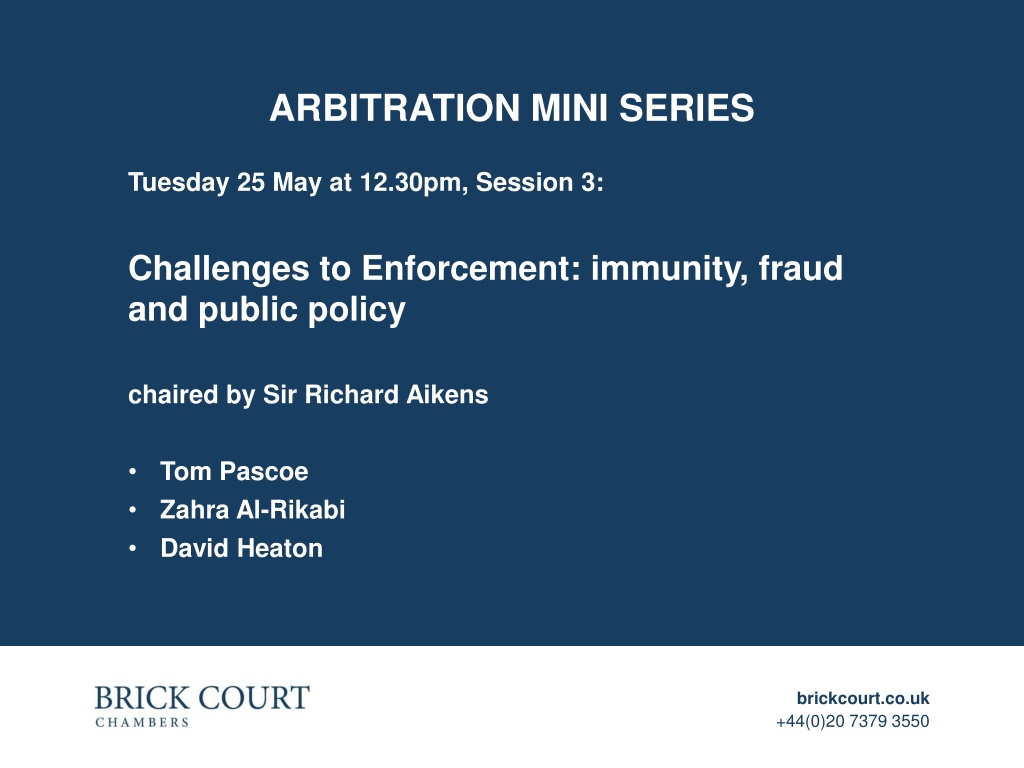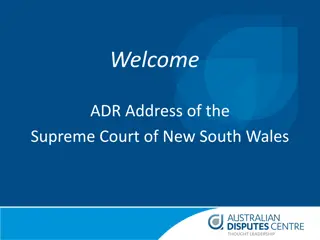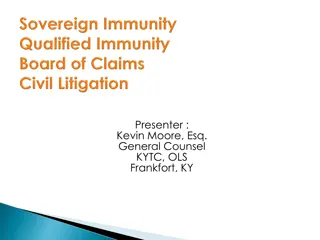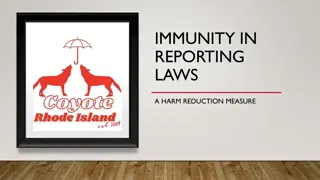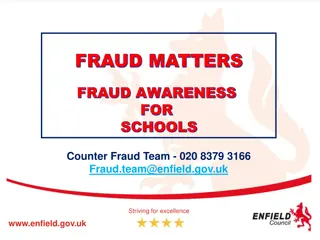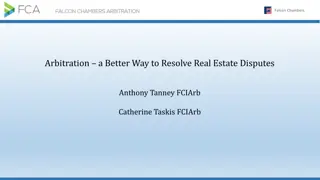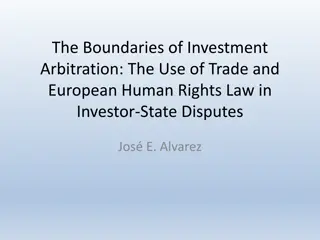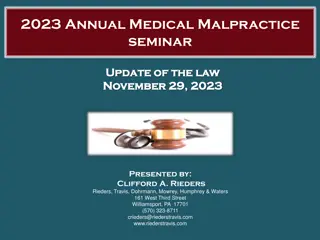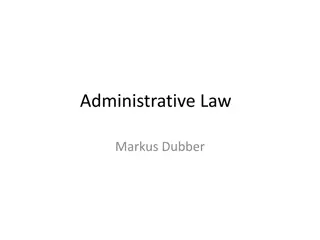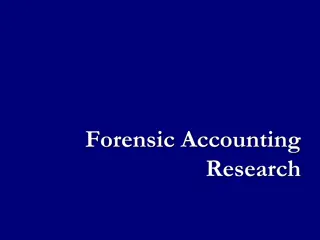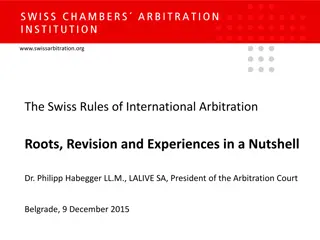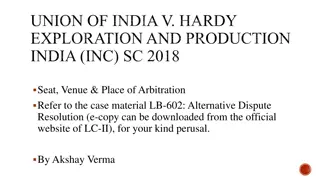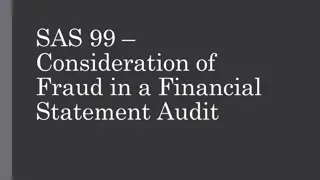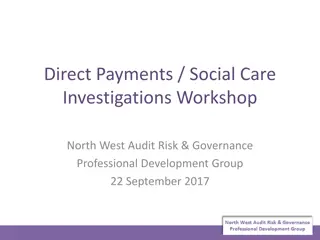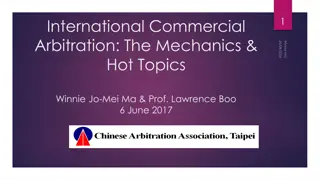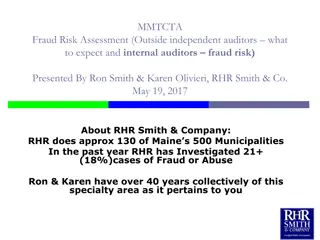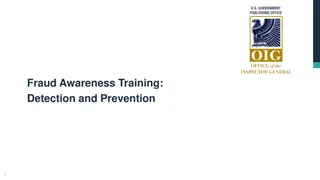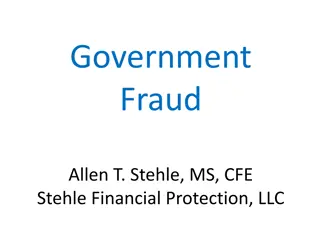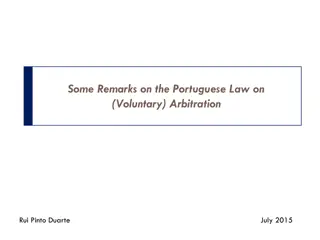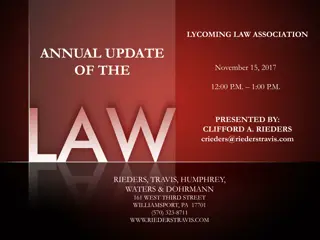Challenges to Enforcement in Arbitration: Immunity, Fraud, and Public Policy
Session 3 of the Arbitration Mini Series on May 25th discusses challenges to enforcement in arbitration, including issues related to immunity, fraud, and public policy. Topics such as extensions of time in fraud challenges, the 1996 Arbitration Act, the Kalmneft factors, and fraud cases in arbitration are explored with practical examples.
Download Presentation

Please find below an Image/Link to download the presentation.
The content on the website is provided AS IS for your information and personal use only. It may not be sold, licensed, or shared on other websites without obtaining consent from the author. Download presentation by click this link. If you encounter any issues during the download, it is possible that the publisher has removed the file from their server.
E N D
Presentation Transcript
ARBITRATION MINI SERIES Tuesday 25 May at 12.30pm, Session 3: Challenges to Enforcement: immunity, fraud and public policy chaired by Sir Richard Aikens Tom Pascoe Zahra Al-Rikabi David Heaton brickcourt.co.uk +44(0)20 7379 3550
EXTENSIONS OF TIME IN FRAUD CHALLENGES Tom Pascoe brickcourt.co.uk +44(0)20 7379 3550
1. THE 1996 ACT Parties may challenge domestic awards on grounds of lack of jurisdiction (s.67) serious irregularity (s.68) or error of law (s.69). Any challenge must be brought within 28 days: s.70(3). However, there is a discretion to extend time under s.80(5). brickcourt.co.uk +44(0)20 7379 3550
2. THE KALMNEFT FACTORS Kalmneft v Glencore International AG[2002] 1 Lloyd s Rep 128 per Colman J: (i) the length of the delay; (ii) whether, in permitting the time limit to expire and the subsequent delay to occur, the party was acting reasonably in all the circumstances; (iii) whether the respondent to the application or the arbitrator caused or contributed to the delay; (iv) whether the respondent to the application would by reason of the delay suffer irremediable prejudice in addition to the mere loss of time if the application were permitted to proceed; (v) whether the arbitration has continued during the period of delay and, if so, what impact on the progress of the arbitration or the costs incurred in respect of the determination of the application by the court might now have. (vi) the strength of the application; (vii) whether in the broadest sense it would be unfair to the applicant for him to be denied the opportunity of having the application determined. Are factors (i)-(iii) the primary factors? Nagusina Naviera [2003] 2 CLC 1 at [39] (yes); Ali Allawi [2019] EWHC 430 (Comm) at [47] and FRN v P&ID at [160] (no). brickcourt.co.uk +44(0)20 7379 3550
3. KALMNEFT IN FRAUD CASES Russell says (24th edn at [8-225]): Cases regarding alleged fraud under s.68(2)(g) are arguably treated as special cases for the purposes of granting an extension . Two examples: i. Chantiers de l Atlantique [2011] EWHC 3383 (Comm): Losing party received tip-off of perjury several weeks post- award. Flaux J held it was responsible to take time to investigate, and granted an extension of around one month. ii. Elektrim SA v Vivendi Universal SA [2007] 1 Lloyd s Rep 693: Losing party discovered a document through US disclosure that had been withheld from the arbitration. Aikens J granted an extension of time: Elektrim had acted sensibly and reasonably . brickcourt.co.uk +44(0)20 7379 3550
4. TAKHAR [2019] UKSC 13: A NEW APPROACH? Concerned application to set aside a judgment (not award) on fraud grounds. The key passage is at [54]: We are not required to be perpetually on guard so that we are looking to discover the fraud of another party in my view, it ought now to be recognised that where it can be shown that a judgment has been obtained by fraud, and where no allegation of fraud had been raised at the trial which led to that judgment, a requirement of reasonable diligence should not be imposed on the party seeking to set aside the judgment ([51]). Two exceptions: (1) fraud already raised and rejected at the original hearing; or (2) deliberatedecision not to allege fraud earlier ([55]). Does Takhar apply to arbitration? Cockerill J said it was by no means clear in ZCCM [2019] EWHC 1285 at [219]. brickcourt.co.uk +44(0)20 7379 3550
5. THE LATEST WORD: NIGERIA v P&ID Ongoing application to set-aside US$10 billion award, described as one of the world s largest lawsuits. Nigeria requested unprecedented 3-5 year extension of time. Key points (see [167]-[176], [261]-[276] [2020] EWHC 2379 (Comm)). First, Kalmneft remains the starting point for fraud challenges: [262]. Secondly, merits are important. Nigeria had a strong prima facie case . Thirdly, the Court will examine whether there was a trigger : I accept that there was nothing which Nigeria ought to have been aware of to act as a trigger causing a reasonable person, exercising reasonable diligence, to have discovered the alleged fraud ([264]). Fourthly, had it been necessary, Sir Ross Cranston would have decided that Takhar does apply to arbitration, so no reasonableness requirement applies at all ([183]). brickcourt.co.uk +44(0)20 7379 3550
ENFORCEMENT OF ARBITRATION AWARDS AGAINST FOREIGN STATES Immunity and service Zahra Al-Rikabi brickcourt.co.uk +44(0)20 7379 3550
ARBITRATION EXCEPTION - S. 9 SIA 1978 S.1 of SIA 1978: (1) A state is immune from the jurisdiction of the courts of the United Kingdom except as provided in the following provisions of this Act. S.9 of SIA 1978: Where a state has agreed in writing to submit a dispute which has arisen, or may arise, to arbitration, the state is not immune as respects proceedings in the courts of the United Kingdom which relate to the arbitration. Enforcement proceedings fall within the scope of s.9: Svenska Petroleum Exploration AB v Government of the Republic of Lithuania (No 2) [2007] QB 886, para 117. Disputes falling outside the jurisdiction of the tribunal are not disputes that the state has agreed to arbitrate. A state is not precluded from raising objections in relation to the tribunal s jurisdiction that were not raised before the tribunal: PAO Tatneft v Ukraine [2018] EWHC 1797 (Comm), paras 35 36. brickcourt.co.uk +44(0)20 7379 3550
The Court must determine the issue of state immunity at as early a stage in the proceedings as possible: ETI Euro Telecom International NV v Republic of Bolivia[2009] EWCA Civ 880 128. Any claimant who wishes to bring proceedings against a state must be in a position to address the issue as to the jurisdiction of the court when he seeks to invoke the jurisdiction of the court. If he seeks an injunction against the state on an application without notice, he must do so then. The court must then consider the question of state immunity, since it is required by section 1(2) of the 1978 Act to give effect to the immunity even if the state does not appear. Where injunctive relief is sought, the claimant must deal both with the immunity from the adjudicative jurisdiction of the court and with the immunity from enforcement. It is simply not open to such a claimant to complain that he is not in a position to deal with such jurisdictional issues on its application without notice; and this is even more so on an application on notice brickcourt.co.uk +44(0)20 7379 3550
Hulley Enterprises Ltd & Ors v The Russian Federation [2021] EWHC 894 (Comm), at 229: The jurisdiction to order security under section 103(5) was referred to by Popplewell J in X v E and F as part of the range of remedies which are available to the court as part of the court s toolkit when it is being asked to recognise or enforce the award, and as an adjunct to such an application . That range of remedies under the 1996 Act is available, in my view, only if and when the court has determined that the defendant state lacks immunity, so that the court can assume jurisdiction over it. To purport to apply section 103(5), including by ordering security or granting an adjournment conditionally upon the payment of security, would be to exercise powers which the court does not, pending an adverse immunity decision, possess. brickcourt.co.uk +44(0)20 7379 3550
SERVICE S. 12 SIA 1978 S.12(1) SIA 1978: (1) Any writ or other document required to be served for instituting proceedings against a State shall be served by being transmitted through the Foreign, Commonwealth and Development Office to the Ministry of Foreign Affairs of the State and Service shall be deemed to have been effected when the writ or document is received at the Ministry. General Dynamics United Kingdom Ltd v Libya [2019] EWCA Civ 1110 - It was not mandatory that either the arbitration claim form or the order permitting enforcement of the award be served through the FCO pursuant to s. 12(1). - Rather the order permitting enforcement had to be served pursuant to CPR r. 62.18 and r 6.44. - The court had jurisdiction in an appropriate case to dispense with service of such an order, in accordance with CPR rr 6.16 and/or 6.28. brickcourt.co.uk +44(0)20 7379 3550
CAN THE COURT INTERVENE ON GROUNDS OF PUBLIC POLICY? David Heaton brickcourt.co.uk +44(0)20 7379 3550
NEW YORK CONVENTION Article V(2) 2. Recognition and enforcement of an arbitral award may also be refused if the competent authority in the country where recognition and enforcement is sought finds that: (a) The subject matter of the difference is not capable of settlement by arbitration under the law of that country; or (b) The recognition or enforcement of the award would be contrary to the public policy of that country. brickcourt.co.uk +44(0)20 7379 3550
UNCITRAL 2006 MODEL LAW Article 34(2) (applications to set aside): An arbitral award may be set aside by the court specified in article 6 only if: (b) the court finds that: (ii) the award is in conflict with the public policy of this State. Article 36(1) (refusal of enforcement): Recognition or enforcement of an arbitral award, irrespective of the country in which it was made, may be refused only: (b) if the court finds that: (ii) the recognition or enforcement of the award would be contrary to the public policy of this State. brickcourt.co.uk +44(0)20 7379 3550
ARBITRATION ACT 1996 SECTION 68 68. Challenging the award: serious irregularity. (1) A party to arbitral proceedings may (upon notice to the other parties and to the tribunal) apply to the court challenging an award in the proceedings on the ground of serious irregularity affecting the tribunal, the proceedings or the award. (2) Serious irregularity means an irregularity of one or more of the following kinds which the court considers has caused or will cause substantial injustice to the applicant (g) the award being obtained by fraud or the award or the way in which it was procured being contrary to public policy; brickcourt.co.uk +44(0)20 7379 3550
ARBITRATION ACT 1994 SECTION 103(3) 103. Refusal of recognition or enforcement (1) Recognition or enforcement of a New York Convention award shall not be refused except in the following cases. (3) Recognition or enforcement of the award may also be refused if the award is in respect of a matter which is not capable of settlement by arbitration, or if it would be contrary to public policy to recognise or enforce the award. brickcourt.co.uk +44(0)20 7379 3550
APPROACHES TO PUBLIC POLICY AND SIGNIFICANT UNCERTAINTY General global trend towards a narrow interpretation of public policy in context of enforcement (but variations) IPCO (Nigeria) Ltd v Nigerian National Petroleum Corp [2005] EWHC 726 (Comm), [2005] 2 Lloyd s Rep 326 at [13] (Gross J): considerations of public policy, if relied upon to resist enforcement of an award, should be approached with extreme caution The reference to public policy in s 103(3) was not intended to furnish an open-ended escape route for refusing enforcement of New York Convention awards. Instead, the public policy exception in s 103(3) is confined to the public policy of England (as the country in which enforcement is sought) in maintaining the fair and orderly administration of justice General recognition that public policy concerns must be serious or grave to justify interference with interest in finality of arbitral award But ultimately a nebulous concept brickcourt.co.uk +44(0)20 7379 3550
APPLICATION OF PUBLIC POLICY IN ENGLAND AND WALES Situations where public policy might lead to setting aside an award in an English seated arbitration / refusal of enforcement in England and Wales: Awards on their face giving effect to an illegal contract or enterprise in the place of performance (eg a contract to pay a bribe, to smuggle carpets out of Iran) or to a corrupt practice: Sinocore International Co Ltd v RBRG Trading (UK) Ltd [2017] EWHC 251 (Comm) [29]-[30] (Phillips J); Soleimany v Soleimany [1998] 3 WLR 811 (CA) An award under a contract that was indisputably illegal at common law (but, if illegality raised and rejected by Tribunal, Court may need to weigh illegality against finality when considering enforcement): Westacre Investments Inc v Jugoimport-SPDR Holding Co Ltd [1999] QB 740 (Comm Ct) 767C-768A (Coleman J) An award upholding a fraudulent claim to payment based on presentation of documents which were admitted (or found by the arbitral Tribunal) to be forgeries, but not the mere circumstance that a party to the arbitration engaged in such fraudulent conduct where this is not the basis of the award (ie mere tainting ): Sinocore at [46] Judgments obtained in breach of an anti-suit injunction (Civil Jurisdiction and Judgments Act 1982 s 32) awards also? brickcourt.co.uk +44(0)20 7379 3550
ARBITRATION MINI SERIES Tuesday 25 May at 12.30pm, Session 3: Challenges Enforcement: immunity, fraud and public policy chaired by Sir Richard Aikens Tom Pascoe Zahra Al-Rikabi David Heaton brickcourt.co.uk +44(0)20 7379 3550
